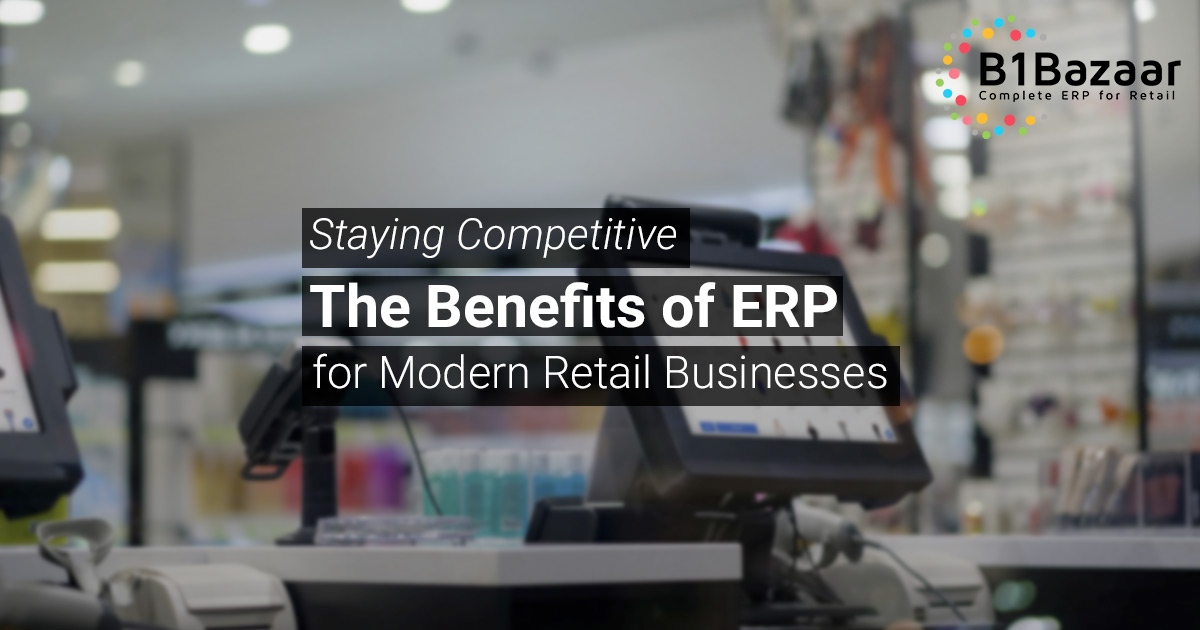The modern retail industry is very competitive. Modern retail businesses are constantly looking towards re-inventing their businesses if needed and are increasingly looking towards innovative solutions that can give them a competitive edge.
Unique retail industry ERP software stood out as one of those solutions. Retailers today have realized the value of streamlined operations.
ERP software for retail businesses not only addresses the industry’s pressure points but also helps manage and enhance customer experiences and ultimately drives growth.
ERP for retail industry ticks all the right boxes such as managing customer data & relationships, e-commerce & multi-location stores, product discounts, pricing, moving merchandise, and more.
On top of it, it centralizes all business data into a unified database that eliminates any duplications, delays, and errors, provides quick access to integral business data and fosters effective communication between the different arms of a retail business.
In this blog, we’ll delve into the myriad of benefits that ERP for retail industry brings to modern retail businesses
Efficient & Streamlined Operations
Modern retail industry ERP software encompasses and integrates all primary and secondary functions of a retail business. Inventory management, sales, finance, human resources, Purchases etc. are all unified and streamlined into a single platform. This directly results in better coordination and communication between different departments.
Integration of POS
Point-of-sale (POS) is arguably one of the most important aspects of a retail business. After all, POS machines are responsible for all transactions that happen on a day-to-day basis in retail stores. Modern ERP software for retail businesses understands that and integrates POS seamlessly. This results in the POS machines feeding all that data into the main system, eliminating any errors and reflecting it immediately in the centralized database.
Customer Relationship Management (CRM)
The customer is King in Retail. Hence, maintaining a good relationship is them is a given. Many modern ERPs for retail industry include CRM functionality. It allows retailers to manage all customer information and interact with them in the best way possible to improve customer service, increase their loyalty to the brand, and manage an excellent relationship with them.
Focus on Customer Experience
Thanks to CRM capabilities, retailers get a 360-degree view of customer data. This helps them personalize the shopping experience and create an experience that the customer remembers. These often include targeted promotions & marketing strategies, customized offers, and personalized recommendations based on customer behaviour and buying preferences.
Inventory & Warehouse Management
Efficient management of Inventory and Warehouse is critical for retail businesses. ERP software for retail business help in optimising stock levels, reducing excess inventory, and preventing stockouts. It can also automate reorder points and facilitate better demand forecasting. Retailers can also manage warehouses with ease as they are linked to each other for better material management, store management and more.
Forecasting Demand
Demand forecasting is another benefit of retail industry ERP software. Meeting customer expectations is paramount. Hence, ensuring an optimum level of products is a must. Demand forecasting allows retailers to gauge consumer demand based on past sales data, purchase patterns, and more. This data aids in better inventory and warehouse management plus allows for quick tweaks of the current strategies to maximize sales and satisfy customer demand.
E-Commerce & Multi-channel Integration
Retailers today know the value of eCommerce marketplaces. It walks hand-in-hand with the time-tested brick-and-mortar stores. Modern retail ERP solutions offer seamless integration with eCommerce marketplaces. But that’s not it. Customers today also shop through mobiles, tablets, etc. creating a multi-channel business landscape. ERP solutions can integrate all of them, ensure unity across all platforms that the retailers operate in and ensure that crucial data such as price, product information, discounts and promotions are all synchronized.
Business Intelligence, Real-time Data, and Reporting
ERP software is known for its Business Intelligence, Analytics, and reporting features. It provides real-time visibility into crucial business data and is a differentiating factor between it and other business management solutions. For retailers, this results in analyzed data and critical insights that aid informed decision-making based on accurate and up-to-date information. It also helps in identifying trends, understanding consumer behaviour, and making the best decisions possible for the business.
Supplier and Vendor Management
Supplier and vendor management is as crucial as customer management in retail. Managing relationships with them is integral to retail success. ERP for retail industry facilitates efficient management of suppliers and vendor relations. This includes setting up suppliers, tracking supplier performance, contract management, and procurement process optimization. You can also automate purchase approvals for different levels, control price lists for purchases and do more. When all is said and done, retail industry ERP software helps retailers manage excellent relationships with suppliers and vendors
In summary, ERP solutions for retail play a crucial role in modernizing and optimizing retail operations. Apart from the benefits mentioned above they also aid retailers in Efficient Financial Management, Cost Reduction, Scalability and Flexibility, and provide exceptional Mobility amongst others.
It certainly has a transformative effect on the retail business and helps them enhance efficiency in operations, improve customer experiences, stay competitive and chart a course to growth and profitability.
